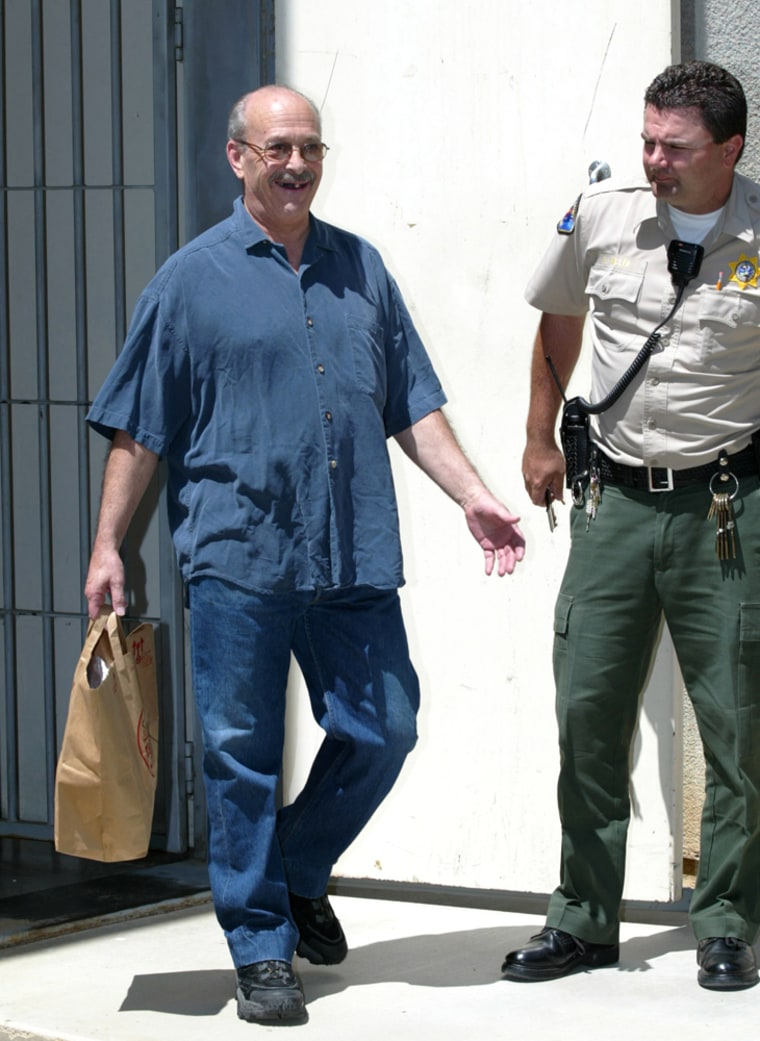Not even murderers and rapists can stand child molesters. Behind bars, they are the marked men, constantly living in fear.
Found guilty of child molestation, John Stoll knew he would never survive with that stigma. So he lied, posing as a drug runner for 20 long years, and managed to avoid attack until his conviction was overturned last week.
“I was terrified,” he said. “I knew the odds weren’t real good that I wasn’t going to get stabbed going to prison as a convicted child molester.”
Stoll walked free on Tuesday after most of his alleged victims recanted and said they lied about being molested back in 1984. Prosecutors maintain Stoll is guilty but said they would not refile charges because of a lack of evidence and the recanted testimony.
During his first days in prison, Stoll began researching crimes that could carry a 20-year sentence. He came across a newspaper article about a man convicted of smuggling marijuana and guns. He decided that would be his crime — “and that’s what I was for 20 years.”
Stoll disclosed details of his life behind bars as he joined his lawyers for a celebratory meal on his first night as a free man — his 61st birthday. He gorged on filet mignon, calamari and chocolate cake.
Close call
He recalled a close call one night: A fellow inmate came to his cell and said he knew Stoll’s secret. The man had discovered his case in the prison law library.
“He says to me, ‘I’ve got paperwork on you,”’ Stoll remembered.
Then the cell doors closed for the night. Stoll thought it would be his last.
“I could feel the blood draining from me. I was scared. I sat all night and didn’t sleep,” he said. “Who’s going to let a child molester walk around? It’s a pretty disgusting crime.”
By a stroke of luck, the next morning there was a riot in the mess hall and the inmate who threatened to expose Stoll was whisked away. A guard later came to Stoll’s cell and handed him a bundle of the other inmate’s papers — the details of Stoll’s conviction.
“I tore it up and flushed it down the toilet,” Stoll said. “More than once, a prison staff member saved my life.”
‘For 20 years, nobody stabbed me’
Stoll refused the protective custody offered to most child molesters because it would have meant 23 hours a day alone in a cell. He knew he could not take the solitude, so he banked on his drug-running story.
“For 20 years, nobody stabbed me, so I must’ve said the right things,” Stoll marveled.
Stoll’s ability to keep his conviction a secret was “quite remarkable,” said Anne Mania, an attorney at the San Rafael-based Prison Law Office, which handles civil rights issues for inmates.
“There’s a huge stigma attached to being a child molester, so they’re often the victims of violence by other prisoners. A lot of them are parents, and everybody can identify that the abuse of children, particularly sexual abuse of children, is wrong. There’s never any justification for that, whereas somebody might be able to, in his or her mind, justify a murder or a rape.”
Stoll was convicted as part of an alleged child molestation ring that supposedly involved sodomy, group sex and pornographic photography. But no pictures were found — in fact, prosecutors presented no physical evidence at the trial. None of the children, ages 6 to 8, were examined by doctors. The case rested on testimony alone.
Most alleged victims recanted
Two Innocence Project groups in California won Stoll’s freedom after tracking down his alleged victims and persuading most of them — now adults — to come forward once again. Four of those accusers testified in January that investigators pressured them until they lied. A fifth testified he has no memories from that part of his childhood.
The sixth accuser, Stoll’s own son, Jed, still insists his father molested him. Stoll blames that on a bitter custody dispute, saying his wife at the time had filled the boy’s head with lies.
Stoll said that as the case against him began to unravel, his story appeared in the newspapers in recent months. But he said guards and fellow inmates came to believe that he had been railroaded, and he continued to stay out of danger.
Stoll was a fit man when he went to prison in 1985, a carpenter with strong hands and a full head of dark blonde curly hair. Now, deep wrinkles cross his forehead, and his gray mustache frames a mouth with just seven teeth remaining, many lost to gum disease and medical neglect while in prison.
He has no other family left. His mother, who paid for his defense, died while he was behind bars.
“But she always knew I was innocent,” Stoll said. “That’s what matters.”
